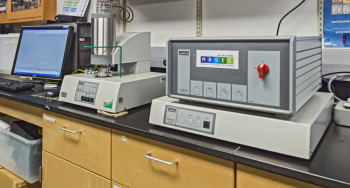
The high temperature Differential Scanning Calorimeter (DSC) from Netzsch is designed to measure thermal energy events from room temperature to 1400 °C. The instrument is capable of quantitative and qualitative measurements and can run in several gas environments.
Sample materials are held in crucibles made of alumina, graphite or platinum depending on the sample composition and reactvity. A crucible containing the sample and an inert reference crucible are then placed in the instrument chamber, on a platforms connected by a thermocouple. Tests are performed in a shared environment and thermodynamic properties of the sample material can be calculated by comparison..
Measurable Properties
- Specific Heat (aka Heat Capacity or Cp) as a function of temperature
- Transition Enthalpy (aka Latent Heat) for melting and other phase changes
- Temperatures of Melting & Phase Transformations
- Temperature and energy change of Glass Transition & Crystallization
Calibration
The instrument is calibrated with a series of high purity metals. Calibration curves are verified every 3 months, as needed. Sapphire standards are also available for users.
Examples of Use
| Property | Method |
|---|---|
|
Specific Heat Capacity as a function of time, Cp(t) |
Specific heat capacity (Cp) |
|
Enthalpy-temperature function |
Enthalpy (ΔH) |
|
Enthalpy changes, enthalpy of conversion |
Integration |
|
Enthalpy of fusion, crystallinity, (ΔHfus) |
Integration, crystallinity |
|
Melting Behavior (liquid content, liquid fraction) |
Integration (partial areas), Conversion |
|
Melting point, solidus and liquidus point, (TM) |
Onset, Purity and Integration |
|
Melting point of semi-crystalline plastics, (TM) |
Peak, Integration |
|
Purity of non-crystalline plastics |
Purity |
|
Melting point of the pure substance, (TM) |
Purity |
|
Crystallization behavior, degree of crystallinity and supercooling |
Onset, Integration and Conversion |
|
Solid-Solid transition, polymorphism |
Integration, Onset and Conversion |
|
Vaporization, Sublimation and Desorption |
Integration and Conversion |
|
Glass transition, amorphous softening, (TG) |
Glass Transition (TG) |
|
Curie temperature, temperature of a lambda transition, (TC) |
Peak and Integration |
|
Thermal decomposition, pyrolysis, depolymerization |
Integration, Onset and Kinetics |
|
Temperature Stability |
Onset, Integration and Kinetics |
|
Chemical Reactions |
Integration and Kinetics |
|
Reaction Enthalpy, (ΔHrxn) |
Integration |
|
Oxidative degradation, oxidation stability, oxidation induction time |
Onset |
|
Content Determination |
Content |
Lab:
Location:
The High Temperature DSC is located in Room 1023, TEMPO Labs, in the Materials Research Laboratory.
Instrument Information and/or Manual:
| Attachment | Size |
|---|---|
| 199.29 KB | |
| 612.71 KB | |
| 662.89 KB | |
| 544.59 KB | |
| 2.07 MB | |
| 3.8 MB |
Contact:
For individuals wishing to use the TEMPO DSC, training is available on a quarterly basis. Self-train options are also available.
For more information please contact amanda [at] mrl [dot] ucsb [dot] edu (Amanda Strom).
